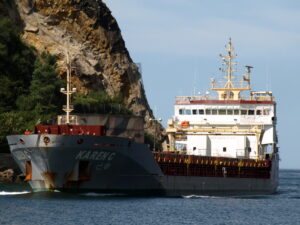Waste wood to power ocean-going vessel in 40-day sea trial

The 50kW hydrogen auxiliary engine was created by Carnot – which was recently awarded £2.3 million in a UK government grant to develop its technology.
The engine will be tested at Brunel University before being mounted on one of Carisbrooke Shipping’s K-class cargo vessels for a trial through the Irish Sea between Bristol and Belfast ports in March 2025.
The global shipping industry accounts for 3% of worldwide greenhouse gas emissions, and all vessels must reduce their levels by 40% compared with 2008 levels by 2030. By 2050 the industry must meet net zero targets.
Smaller vessels travelling shorter distances could try electrification or the use of fuel cells, but this is not viable for ocean-going vessels.
Carnot’s 50kW engine is a precursor to 200 to 400kW auxiliary engines, and eventually 1 to 10MW main engines.
CSS, based in Deeside, Wales, stepped in to supply hydrogen for the trial after Carnot struggled to source fuel.
CSS recently secured almost £4 million in government funding to make its biomass and waste-to-hydrogen plants even greener by using carbon capture from its hydrogen production.
CSS have developed an advanced gasification process that generates electricity, heat and hydrogen gas from waste products, including biomass like waste wood and other selected non-recyclable materials.
The process also generates valuable biochar that has many applications and can sequester carbon.
Karen Taylor, chief marketing officer of Compact Syngas Solutions, said: “The marine industry is facing some huge challenges as it tries to decarbonise, with hydrogen and methanol increasingly looking like the best solutions.
“We’re looking forward to playing our small part in this hugely exciting trial, which could pave the way to drastically reducing emissions in the marine industry.”
Jeremy Howard-Knight, head of business development at Carnot, said: “Sourcing hydrogen for our trial has proved harder than we expected, and we’re massively grateful to Compact Syngas Solutions for helping out.
“It’s incredible to think that these huge ocean-going vessels are being powered by waste wood that could have ended its days by rotting on a tip.”
















